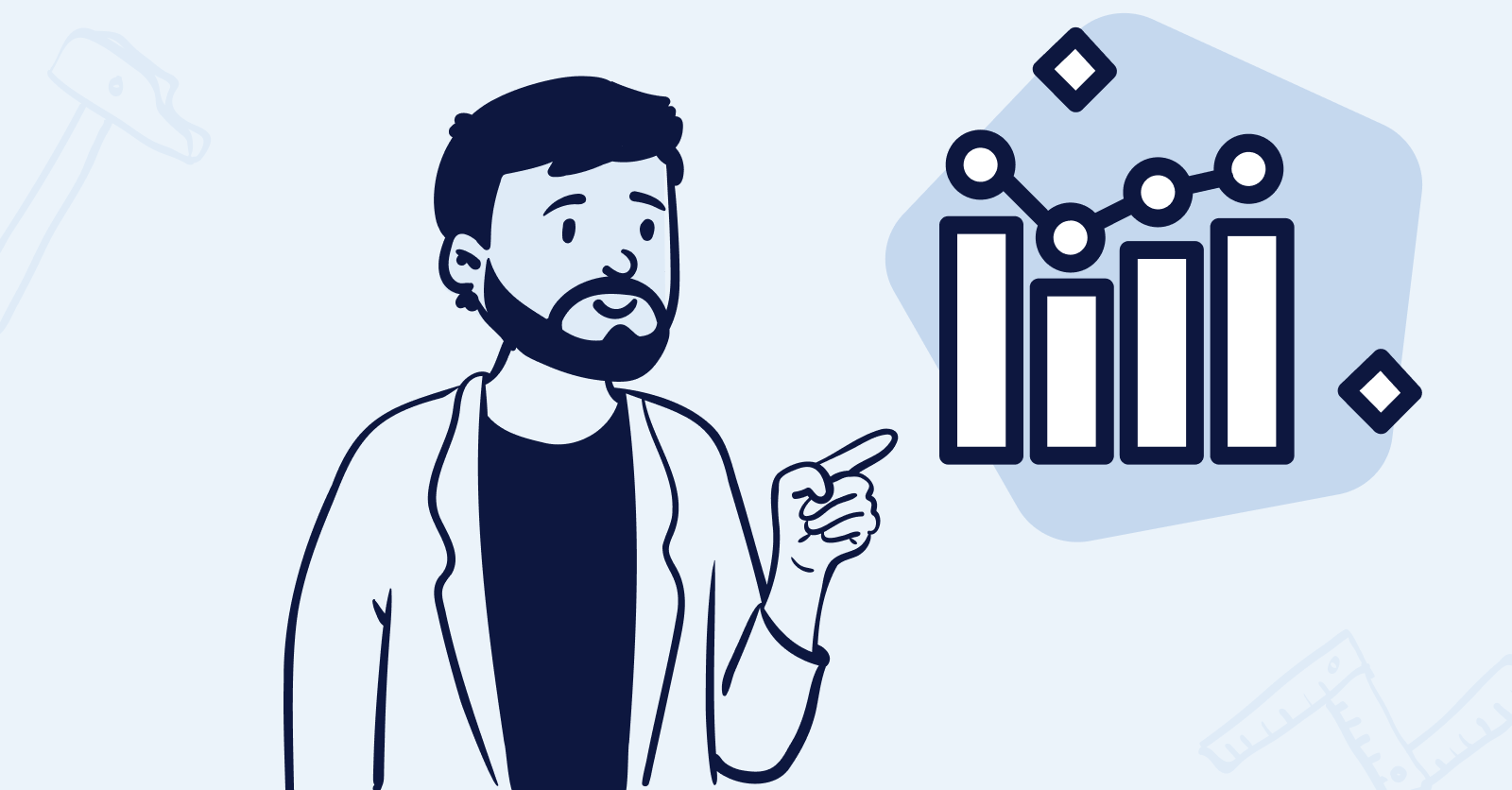Artificial intelligence (AI) is everywhere you look. Every other day it's in the news, and it's only a matter of time until it starts to impact how we all work.
So let's take a quick look at how AI fits into construction and how it could impact you in the future.
AI in the construction industry
When you think of AI, you might start drawing some random assumptions about world-dominating robots trying to take over the world and kill Will Smith in the process. But the truth is, it's a lot less scary than that.
In fact, Google's latest AI generator 'Bard' couldn't currently tell you accurate information about the Hubble telescope (see below). So it's fair to say that your job, the world, and Will Smith are all safe for now.
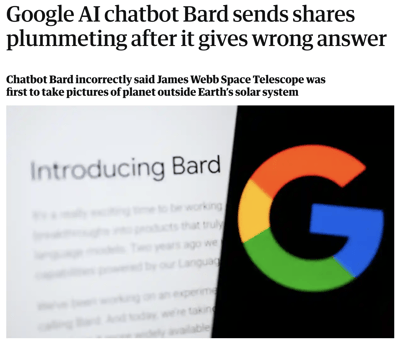
(Image Source: The Guardian)
The simplest way to think of AI is as an extensive collection of historical data that can be sorted and analysed to predict future outcomes. Well, that's what AI chatbot 'ChatGPT' told me anyway.
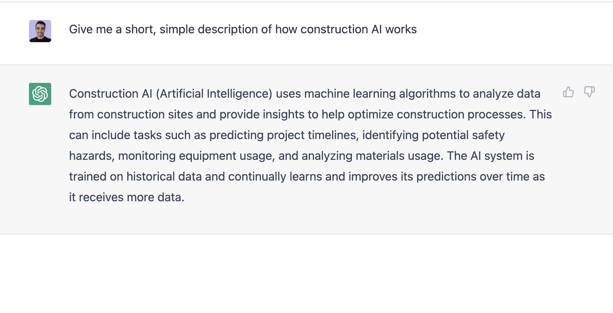
As you can see from the response, this method of collecting and analysing data can help with things like risk management, health and safety, planning and design.
Whilst AI is still in its infancy, it is among some of the most exciting tools and trends emerging in the construction industry. In the near future, AI could help you reduce administrative tasks, improve productivity, and increase profitability on your project.
Why the construction industry needs to adopt AI
It's no secret that most construction projects struggle with time management and budgeting. In fact, in a McKinsey case study, they found that most megaprojects reach completion 20% over time estimates and 80% over budget.
Whilst project teams and operatives do what they can to try and stay on top of things, there are just too many variables to consider.
Fortunately, there are a variety of fantastic new tools being developed within the industry that can help streamline old processes, reduce risk, and save your project both time and money.
One emerging tool that can help tackle those issues is artificial intelligence (AI). With access to better, faster, data-driven resources, teams will be able to make more informed decisions that will ultimately lead to improved site performance.
Use of AI in construction
As you will see below, there are several ways that AI can and will likely impact the way you work over the coming years. Pretty much any task that requires analysing mass quantities of data will likely be streamlined and improved by AI. We've expanded on a few cool examples below.
Risk management
Construction sites are inherently high-risk environments. There are lots of people coming in and out; heavy machinery is in operation, and there might be demolition taking place...
Whilst there are already tools and procedures to help you manage these hazards, more can be done to help keep your site risk-free. AI machine learning tools can aggregate data around potential risks on site and prioritise them, making it easier for teams to work out where time and resources can be best allocated.
When put in the right hands, this kind of software could dramatically improve how risk is managed on your site, saving hours of admin duty and making it easier to keep people safe.
Design
There is a lot that goes into the planning and design of large construction sites. Typically, Building information modelling (BIM) is used to create 3D models of those designs that different teams and stakeholders can analyse. And the requirements of all of these teams need to be considered during design.
As you may well be aware, trying to juggle so many different needs is a challenging task, and if not done correctly, you may end up with clashes and disputes, which lead to delays or work being re-done.
However, with AI tools, all of this information can be considered at scale. AI modelling could help you reduce clashes, mitigate issues and even propose alternative designs that would be more efficient.
Planning
Traditionally, a lot of time, effort and resources go into producing plans and master schedules. Not only is this very time intensive, but these schedules can quickly come away from the reality of the project if not well managed.
In an interview with ConstructionDive, Dr Dan Patterson (Chief Design officer at InEight) discusses how AI might collate vast amounts of historical data and produce hundreds of potential plans in a fraction of the time it currently takes.
These plans could be forecasted and cross analysed to help reduce unexpected issues and get the planning team off on the right foot. As the site progresses, this information could be updated, and planners and engineers could make better-informed decisions about how the site should progress.
This approach could be a huge step forward for the Critical Path Method and help planning teams identify potential issues that would have otherwise been nearly impossible to spot.
Data management
If it hasn't been made apparent yet, one of the most significant benefits of AI and machine learning is its ability to quickly store, analyse, and forecast data.
Because of this, it's likely that AI can and will affect the way you work in the future. Whether you're involved in budgeting, forecasting, tendering, design, risk management, safety, or anything else, AI can make it easier for you to sort data and interpret the story that data can tell you.
If you want to learn more about tools that can help in any of these areas, check out the 7 Types of Software You Need to Run Your Project.
People and AI working together
Whilst it's cool to think about all of the areas that AI could help you better manage your project, it's important to remember that human intelligence will still be needed to put AI to good use. At the end of last year, our CCO, Jason Lancini, discussed this topic on the Project Chatter Podcast.
Rather than thinking of AI as something that will do your job for you, it's better to think of it as a co-pilot that helps make life a little easier.
For example, imagine being able to ask AI to make you a spreadsheet that takes a given set of data and calculates your concrete volume per day. That kind of function could save you a couple hours of admin that you'd then have back to focus on more important things.
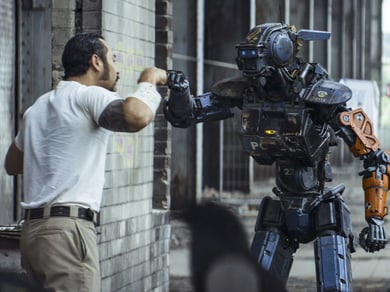
Advantages of AI in construction
As mentioned above, AI can and likely will benefit your project and change the scope of your work in the near future. With its ability to read and interpret data and generate outputs, AI could help:
- Reduce risk
- Reduce clashes
- Improve health and safety
- Improve time management
- Increase productivity
- Increase profitability
But none of those things can (currently) be achieved without human intelligence guiding it and putting the information and outputs of AI into practice.
Disadvantages of AI
Fear of redundancy
When many people think of AI, they think of some all-capable machine that's going to threaten world domination and redundancy. However, there's little to worry about.
Whilst the thought of AI and, indeed, any new tech can be pretty daunting, the reality is that it's just another technological advancement, no different to the computer or a new type of digger.
General consensus says that AI will remove the need for admin tasks. More rigorous, hands-on, or strategic tasks will still need to be carried out by people.
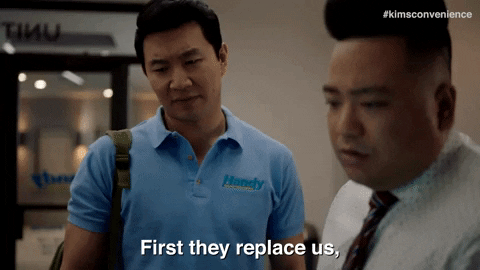
It requires human input
As mentioned above, AI will still need human intelligence to give strategic input and direction towards how AI is used. Much like a digger still needs an operator. Whilst AI will help remove some of your job's struggles, you'll still have to show up and do it.
Conclusion
AI is a pretty exciting thing to think about. It could reduce costs, minimise risks, and generally change the way things are currently done in quite a dramatic way. But it's still in the very early stages of development.
So whilst it's fun to think about the potential use cases for AI and the bigger picture impact it might have, I wouldn't go running off looking for AI tools just yet.
That being said, if you consider yourself the early adopter type, it may be good practice to ensure all of the software you use has a history of providing quality integrations with other tools.
This won't guarantee you get to play with AI in the immediate future, but it will help make sure you don't end up with software that sucks when everybody else is playing with the latest industry developments.

